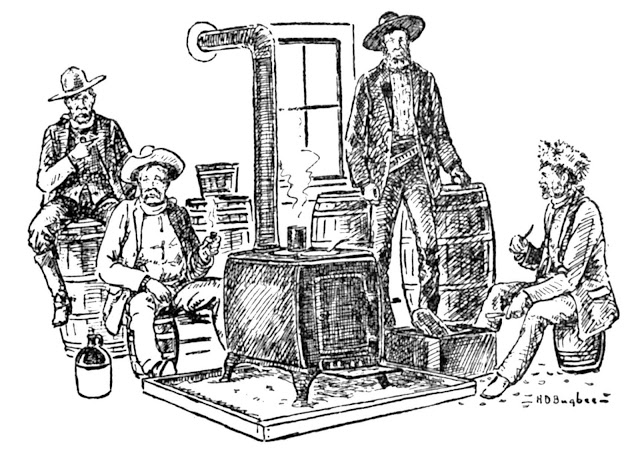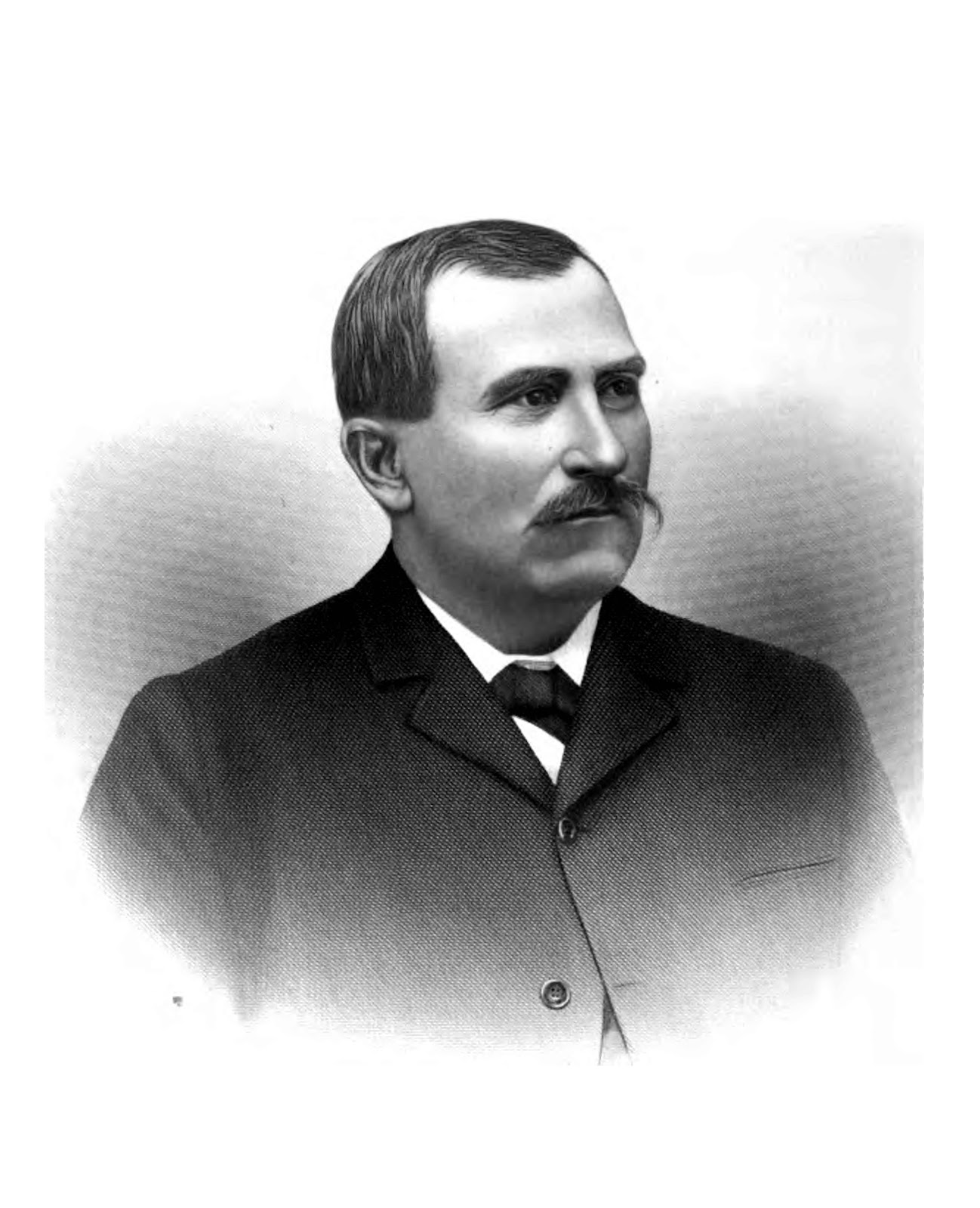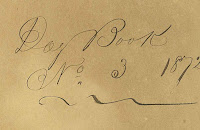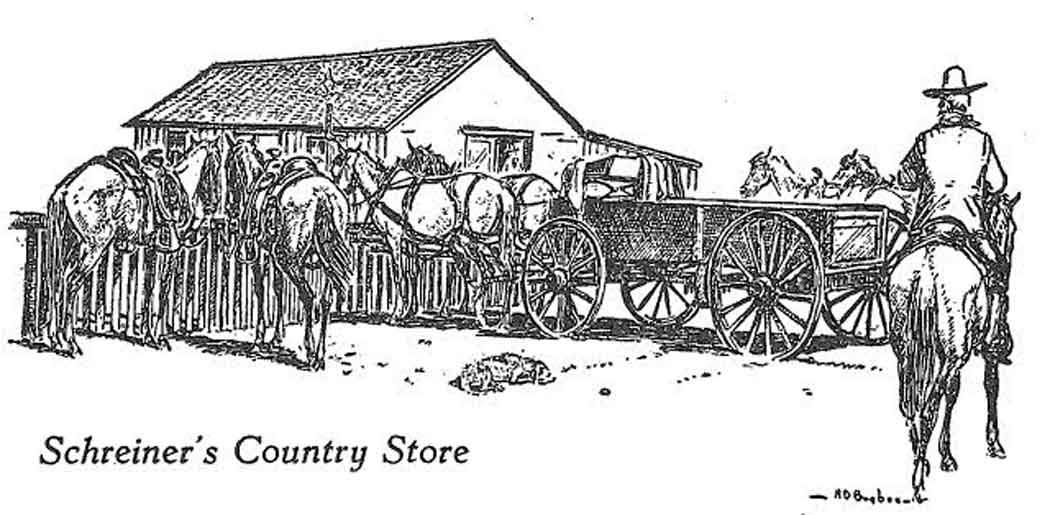 |
| A fanciful illustration by Harold Bugbee of the interior of Faltin & Schreiner, the store opened by Charles Schreiner in downtown Kerrville in 1869. Click on any image to enlarge. |
Recently I was given a small bookkeeping book from 1872, called a Day Book, where the bookkeeper would record each transaction throughout the business day, transferring the items later to each customer’s ledger card. After some sleuthing, I discovered the bookkeeper was none other than Charles Schreiner.Charles Schreiner, who is remembered today as the philanthropist who founded what is now Schreiner University, suffered through years of poverty. In his early days, he was in numerous dangerous situations where his living or dying seemed to dangle from a single thread.
In 1872, the store he ran in partnership with Comfort’s August Faltin was less than three years old. While the bookkeeping book in my collection shows the store was experiencing some success, it does not portray an enterprise destined for financial greatness. It certainly does not forecast a businessman who would have such an oversized impact on the early economy of Kerrville and Kerr County.
 |
| Pages from the 1872 Day Book |
Last week I indicated the most frequent sales entry: drinks by the glass at 10 cents each. My best guess from other entries is the ‘drink’ was whiskey. Last week, I also hinted one frequent customer of this product was Joseph A. Tivy, the first mayor of Kerrville, and the man for whom our high school is named.
One entry shows Tivy purchasing eight drinks. While there is no evidence all of the libations were for him individually – he could have bought a round for his friends – I’m certainly glad Tivy wasn’t driving home. The distance from Faltin & Schreiner in 1872 to the site of the Tivy Hotel is only 3 blocks.
Perhaps Tivy gave Schreiner the keys to his horse and walked home.
Aside from whiskey, what could you buy at Faltin & Schreiner in 1872?
First, some of the easiest to guess items:
Many customers bought coffee, tobacco, ‘ceegars,’ tea, flour, rice, soap, cheese, jelly, sugar, needles and thread, matches, candy, table salt, and crackers.Produce was available, too. Many times, an accounting entry where Schreiner purchased local produce from a customer was followed by entries where the same produce was sold to other customers. For example, peaches. Other produce available included potatoes, apples, corn, and onions. Most of the fresh produce was grown locally, I’m guessing.
The store sold an impressive amount of fabric, ranging from calico to chambray. In addition, there are many entries of sales of ribbon, buttons, and other sewing items.
The inventory included items useful on the frontier: balls of lead, caps, and various knives. Axes and axe handles were available. Axle grease and wagon parts were sold. Some horse tack and equipment was available in the store. Shovels, saws, hammers, saws, and hardware including nails, screws, hinges, doorknobs, and grinding stones are among the recorded sales.
 |
| Charles Schreiner |
I was surprised by the number of clothes, shoes, and hats available in the little store. Shirt collars and corsets were also sold. Stocking a variety of sizes of clothing would have been difficult – especially when the sizes ranged from children to adults. This clothing inventory would have been more difficult in such a small building – the first store only measured only 16 x 18 feet.
Another item frequently purchased at the store was textbooks. Though the period covered by this particular accounting book is June and July, 1872, school must have been either in session, or would begin soon. The books were ‘Reader’ and ‘Mathematics’ books. There are also several notations of what looks like ‘tuition’ paid by customers; perhaps the store made payments to the teacher from these ‘tuition’ payments.
The biggest customer (though not the most frequent) in this particular Day Book was Creed Taylor, though most of his transactions were made by others and charged to Taylor’s account.
In 1872, Taylor was establishing a ranch in Kimble County, along the James River, near Noxville.Creed Taylor arrived in Texas in 1824, as a four-year-old boy. His served Texas in many ways, both as a soldier in the Texas Revolution, and later as a Texas Ranger.
According to the book on Charles Schreiner’s store written by J. Evetts Haley, in 1872 and 1873, Creed Taylor owed the store $5565.37 for supplies, which, in 1873, was settled “for cattle --.” It is obvious, looking at the Day Book in my collection, Taylor was buying a lot of merchandise on credit with Schreiner. He paid off his debt with cattle.
The payment of cattle, which settled Taylor’s account with Schreiner, may have been the start of Schreiner’s cattle enterprises, which became an important foundation of Schreiner’s wealth during the 1870s.
It’s amazing to me what you can learn from looking over a bookkeeping book from 1872.
Until next week, all the best.
Joe Herring Jr. is a Kerrville native who collects Kerrville and Kerr County historical items. If you have something you’d care to share with him, it would make him very happy. This column originally appeared in the Kerrville Daily Times November 25, 2023.
Thanks for reading. This newsletter is free, but not cheap to send. To show your support, forward it to someone who’d like it, or buy one of my books. Thanks so much. (And thanks to all of you who bought books this week!)





Great story, Joe! I always enjoy reading your blog. One thing I am unsure of. I’ve seen the marker on the Faltin Store in Comfort. I believe it says that my great grandfather and August Faltin were first partners in the store there in Comfort. If so, please fill in the blanks from Comfort to Kerrville. Your friend, 4
ReplyDeleteThank you Mr. Herring for all of your articles. Every one has such great historical information and I appreciate the time plus effort you go to for your reader's enjoyment.
ReplyDeleteI love this! What wonderful detective work from such a simple source! How neat!
ReplyDelete